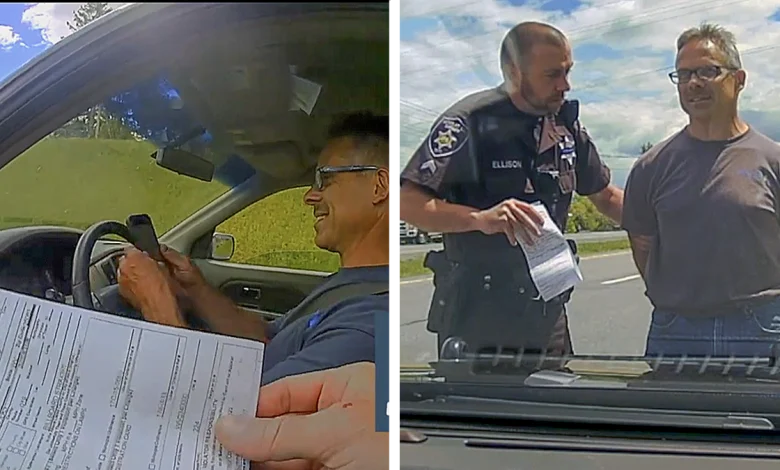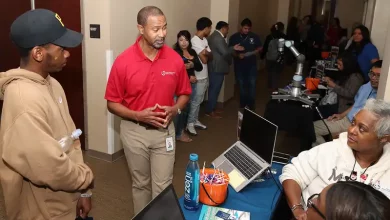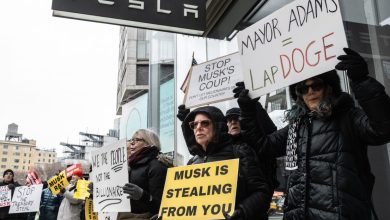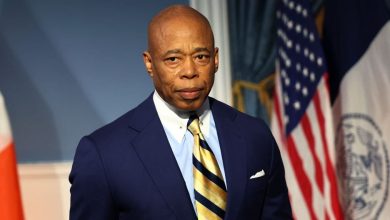West Virginia Deputy Handcuffs Man for Laughing During Traffic Stop after Pulling Him Over for Flashing Headlights to Warn Drivers of Speed Trap

A West Virginia sheriff’s deputy first pulled over William Iannacone for flashing his headlights at oncoming cars to warn them about an upcoming speed trap even though there is no law against that and courts have ruled it is a form of protected speech
Nicholas County sheriff’s deputy J.D. Ellison then became irate when Iannocone laughed at him for threatening to arrest him over an unsigned registration card, ordering him out of his car to frisk and handcuff him, even though the U.S. Supreme Court has long ruled that police can only do this if they suspect a driver may be armed and posing a threat.
Then, while Iannocone was handcuffed and standing on the side of the road, Ellison spoke to an unnamed prosecutor by phone who apparently advised him not to arrest Iannocone for laughing or flashing his lights

Nevertheless, Ellison gave Iannocone two citations before releasing him; one for the unsigned registration, the other for flashing his lights, claiming Iannocone violated the West Virginia statute on flashing lights that mostly pertains to non-first responders using red, blue or yellow flashing lights on their car.
A municipal judge dismissed the citation over the unsigned registration but convicted him for flashing his lights, which Iannocone successfully appealed, reversing the conviction.
Then when Iannocone filed a lawsuit, accusing Ellison of violating his First and Fourth Amendment rights, the deputy asked the court to dismiss the case based on qualified immunity, which is a legal doctrine that protects police officers from civil lawsuits unless their actions violated “clearly established” statutory or constitutional rights.
However, last week, U.S. District Judge Thomas E. Johnston denied Ellison’s motion to dismiss, allowing Iannocone’s lawsuit to proceed.
According to the judicial opinion that was obtained by West Virginia attorney John H. Bryan, who is representing Iannocone and who also runs the YouTube channel The Civil Rights Lawyer:
Defendants assert that Deputy Ellison is entitled to qualified immunity because it is “debatable and thus not clearly established” that “flashing one’s headlights to warn other motorists” is protected speech. That assertion, however, misses the point.
Every reasonable officer in the United States is aware that retaliation for First Amendment speech is a violation of a person’s constitutional rights. Where, as here, the allegation is that a defendant knew of the speech and reacted to it accordingly, qualified immunity cannot serve as a proper shield.
If, just as Plaintiff alleges, Deputy Ellison knew of Plaintiff’s speech, had no probable cause to initiate the stop, and stopped Plaintiff anyway because of that speech, then the actions make out a classic First Amendment retaliation claim.
The judicial opinion also noted in a footnote that the incident took place on U.S. Route 19 which has earned a reputation as a notorious speed trap, according to West Virginia Motorist Info.
“For what it is worth, the Court takes judicial notice that the section of road in question is a notorious speed trap,” Judge Johnston stated in the footnote.
Watch the video of the traffic stop below:
The Traffic Stop
The traffic stop took place on May 13, 2022, after Iannocone drove past the speed trap and began flashing his headlights to warn drivers to slow down to avoid being pulled over and ticketed.
But one of those drivers was Ellington, who knew exactly what Iannocone was trying to do by flashing his headlights.
“A guy flashing his lights warning everybody you’re sitting there. I’m going after him,” Ellington radioed to the other deputy conducting the speed trap before chuckling to himself.
“That was pretty stupid, wasn’t it?” Ellington tells Iannocone after pulling him over.
“What’s that?” asked Iannocone.
“Flashing your lights at everybody to let them know law enforcement was sitting there running radar.”
“Is that a crime?” asked Iannocone.
“Yeah,” responded Ellington.
Ellington was clearly annoyed that Iannocone was warning drivers about the speed trap because that happens to be a huge revenue generator for the sheriff’s office.
“I’m sure I can articulate some other kind of driving charge in there for doing that too,” Ellington threatened, but without articulating any other ordinance he may have violated.
“I mean, that’s pretty crappy,” the deputy said in reference to Iannocone’s attempt to warn drivers about the speed trap.
Then, when Ellington handed Iannocone the two citations, the driver pointed out that his constitutional rights were being violated.
“Under the constitution, it’s protected by the First Amendment,” Iannocone told the deputy regarding the flashing lights.
“That’s in Tennessee,” the deputy said, apparently believing the U.S. Constitution does not apply in West Virginia.
“And I could take you to jail today for your unsigned registration card,” Ellington said. “But I just wrote you a citation for that. That’s actually up to six months in jail.”
That prompted a chuckle from Iannocone, which angered Ellington.
“You think it’s funny, sir?” Ellington said.
“I’m allowed to laugh, I can laugh all I want to,” responded Iannocone.
That was when Ellington ordered him out of the vehicle and handcuffed him. But he apparently was advised to release him by the unnamed attorney because he removed the handcuffs and allowed him to leave with the two citations several minutes later.
Upon review of the video, Judge Johnston noted several constitutional violations that have already been clearly established by the courts, including pulling him over for flashing his lights, then prolonging of the stop after he had handed him the citations and then frisking him despite the driver never presenting a threat.
“While it is true that an officer may order a suspect out of the car during a valid Terry stop, such order is only valid if an officer ‘possess[es] an articulable and objectively reasonable belief that the suspect is potentially dangerous,’” Johnston wrote in his opinion, citing previous case law.
“Defendants cite nothing to suggest that, between initiating the traffic stop and Plaintiff’s laughter, Ellison noticed anything that would suggest that the encounter became dangerous to him. Without such justification, the act of ordering Plaintiff out of the car is arguably unjustified.”
Watch the video below, where Iannocone’s attorney analyzes the traffic stop and the judge’s recent opinion.




